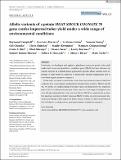Files in this item
Allelic variants of a potato HEAT SHOCK COGNATE 70 gene confer improved tuber yield under a wide range of environmental conditions
Item metadata
| dc.contributor.author | Campbell, Raymond | |
| dc.contributor.author | Ducreux, Laurence | |
| dc.contributor.author | Cowan, Graham | |
| dc.contributor.author | Young, Vanessa | |
| dc.contributor.author | Chinoko, Gift | |
| dc.contributor.author | Chitedze, Gloria | |
| dc.contributor.author | Kwendani, Stanley | |
| dc.contributor.author | Chiipanthenga, Margaret | |
| dc.contributor.author | Bita, Craita E. | |
| dc.contributor.author | Mwenye, Obed | |
| dc.contributor.author | Were, Hassan | |
| dc.contributor.author | Torrance, Lesley | |
| dc.contributor.author | Sharma, Sanjeev Kumar | |
| dc.contributor.author | Hancock, Robert D. | |
| dc.contributor.author | Bryan, Glenn J. | |
| dc.contributor.author | Taylor, Mark | |
| dc.date.accessioned | 2022-04-12T10:31:26Z | |
| dc.date.available | 2022-04-12T10:31:26Z | |
| dc.date.issued | 2022-03-15 | |
| dc.identifier | 278733934 | |
| dc.identifier | f43f3df6-d4e4-4b41-98a5-15a20b331e44 | |
| dc.identifier | 85126255977 | |
| dc.identifier | 000769060000001 | |
| dc.identifier.citation | Campbell , R , Ducreux , L , Cowan , G , Young , V , Chinoko , G , Chitedze , G , Kwendani , S , Chiipanthenga , M , Bita , C E , Mwenye , O , Were , H , Torrance , L , Sharma , S K , Hancock , R D , Bryan , G J & Taylor , M 2022 , ' Allelic variants of a potato HEAT SHOCK COGNATE 70 gene confer improved tuber yield under a wide range of environmental conditions ' , Food and Energy Security , vol. Early View , e377 . https://doi.org/10.1002/fes3.377 | en |
| dc.identifier.issn | 2048-3694 | |
| dc.identifier.uri | https://hdl.handle.net/10023/25172 | |
| dc.description | Funding: This work was funded by the Scottish Government Rural and Environment Science and Analytical Services Division as part of the Strategic Research Programme 2016‐2022, by a GCRF Foundation Awards for Global Agricultural and Food Systems Research funded by the BBSRC project BB/P022553/1 (Quickgro) and EPSRC Reference: EP/T01525X/1, GCRF Global Research Translation Awards, Food Security and Health for East Africa, 2019‐2021, and the European Union’s Horizon 2020 research and innovation programme ADAPT (Accelerated Development of Multiple‐Stress Tolerant Potato), grant agreement No GA 2020 862‐858 and G2P‐SOL (Linking genetic resources, genomes and phenotypes of Solanaceous crops) grant agreement No 677379. | en |
| dc.description.abstract | Previously, we developed and applied a glasshouse screen for potato tuber yield under heat stress and identified a candidate gene (HSc70) for heat tolerance by genetic analysis of a diploid potato population. Specific allelic variants were expressed at high levels on exposure to moderately elevated temperature due to variations in gene promoter sequence. In this study, we aimed to confirm the results from the glasshouse screen in field trials conducted over several seasons and locations including those in Kenya, Malawi and the UK. We extend our understanding of the HSc70 gene and demonstrate that expression level of HSc70 correlates with tolerance to heat stress in a wide range of wild potato relatives. The physiological basis of the protective effect of HSc70 was explored and we show that genotypes carrying the highly expressed HSc70 A2 allele are protected against photooxidative damage to PSII induced by abiotic stresses. Overall, we show the potential of HSc70 alleles for breeding resilient potato genotypes for multiple environments. | |
| dc.format.extent | 14 | |
| dc.format.extent | 1673046 | |
| dc.language.iso | eng | |
| dc.relation.ispartof | Food and Energy Security | en |
| dc.subject | Abiotic stress | en |
| dc.subject | Field trial | en |
| dc.subject | HEAT SHOCK COGNATE 70 | en |
| dc.subject | Potato | en |
| dc.subject | Promoter | en |
| dc.subject | Yield | en |
| dc.subject | QH301 Biology | en |
| dc.subject | QH426 Genetics | en |
| dc.subject | SB Plant culture | en |
| dc.subject | Agronomy and Crop Science | en |
| dc.subject | Food Science | en |
| dc.subject | Forestry | en |
| dc.subject | Renewable Energy, Sustainability and the Environment | en |
| dc.subject | NDAS | en |
| dc.subject | SDG 7 - Affordable and Clean Energy | en |
| dc.subject | NIS | en |
| dc.subject.lcc | QH301 | en |
| dc.subject.lcc | QH426 | en |
| dc.subject.lcc | SB | en |
| dc.title | Allelic variants of a potato HEAT SHOCK COGNATE 70 gene confer improved tuber yield under a wide range of environmental conditions | en |
| dc.type | Journal article | en |
| dc.contributor.sponsor | BBSRC | en |
| dc.contributor.institution | University of St Andrews. School of Medicine | en |
| dc.contributor.institution | University of St Andrews. School of Biology | en |
| dc.contributor.institution | University of St Andrews. Biomedical Sciences Research Complex | en |
| dc.identifier.doi | https://doi.org/10.1002/fes3.377 | |
| dc.description.status | Peer reviewed | en |
| dc.identifier.grantnumber | BB/P022553/1 | en |
This item appears in the following Collection(s)
Items in the St Andrews Research Repository are protected by copyright, with all rights reserved, unless otherwise indicated.

